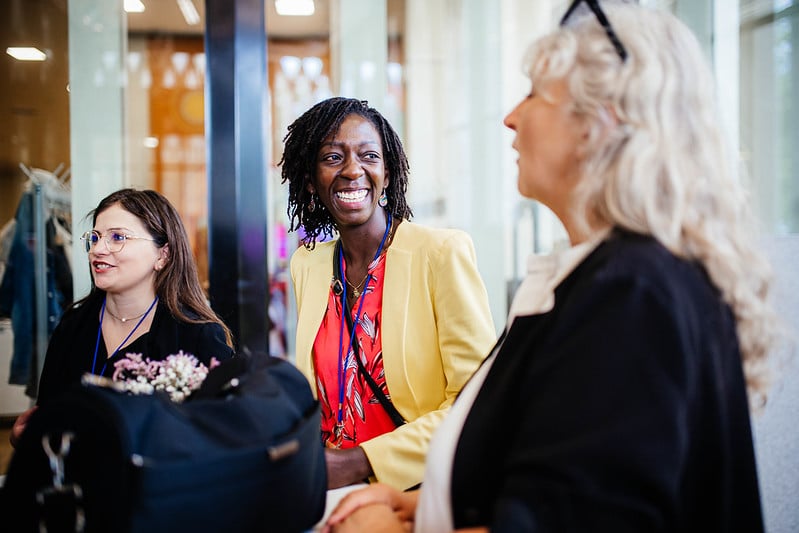Crystal Asige, a singer-songwriter, champion for disability rights, and trailblazing member of the Kenyan Senate, gave a thought-provoking speech at the TUMI2023 Conference. She shared her personal journey with glaucoma and her experience as a young, African, female politician and artist with a disability. The Senator tirelessly advocates for people with disabilities, aiming to challenge societal norms, promote understanding, and pave the way towards a more inclusive future.
Recoining Visually Impaired Person to VIP
“I must confess that I didn’t really want to end up here”, Crystal Asige says at the beginning of her speech, explaining that she has faced more challenges than she bargained for:
“As soon as I was comfortable in my skin, there was racism. As soon as I was confident in my femininity, there was sexism. As soon as I was proud of my youth, there was ageism. And now that I’m comfortable with my disability, there is ableism.”
Many women and girls with disabilities living in Africa face multiple burdens of discrimination and challenges like gender-based violence, a lack of healthcare and education, and low chances of employment. “We are disproportionately uneducated, unemployed, exploited, impoverished, and abused. These are our odds and I had never wanted to end up here.”
Crystal Asige’s eyesight began to decline steadily as a teenager due to glaucoma. She now lives as a visually impaired person but, as she explains with a humorous smile, prefers the abbreviation VIP. “I had to start again to accept, to adapt, unlearn, relearn and, in doing so, I realized that this [pointing at her eyes] is not disability. This [pointing to her temple/head] is disability.” She goes on to explain that disability is the equation of an impairment plus a barrier, such as an inaccessible environment.
Growing up on a small island off the coast of Kenya, Crystal Asige didn’t know about accessibility in buildings, streets, products, services, and technologies. Only when she went to university in the UK did she learn about tactile paving rollerballs at the bottom of traffic lights, sonic traffic lights, and signages with specific contrasting colors. “It’s because of this exposure that I understood that I was further disabled because of living in Kenya. Because there were VIP in the UK that were living life quite independently unlike me.”
Prioritizing accessibility means prioritizing women and climate change

This realization gave Crystal Asige her vision. She explained that women in Africa are the backbone of society. Most of their responsibilities include the need to walk or use public transport on a daily basis – and a fifth of these women have disabilities.
“Inclusive transport is not just about buildings and streets. It’s absolutely connected to our self-efficacy, dignity, independence, safety, confidence, equity, and inclusion.”
This conviction inspired Crystal Asige to become a senator. She was sworn in in October 2022.
In her role as a member of the Kenyan parliament, Senator Asige is advocating for the explicit inclusion of legislation for the disabled and is heavily influencing sector policies on inclusive and barrier free infrastructure. Currently, she is trying to amend the country’s Road Act to include Universal Design. To achieve this, Crystal Asige draws on a piece of research she was a part of, the Road Note 21. Consultants from Africa, India, and the UK developed these guidelines with funding from High Volume Transport and FCDO.
Sustainable and accessible design is key here: “Life has really kicked me in the ass”, Crystal Asige states, immediately apologizing for the term, and explaining that to a big part, this is because of design and infrastructure failures. She calls on designers and planners to create a world where people like her have a better chance, asking them to consider options such as training 10,000 government officials, practitioners, and engineers in Africa on Universal Design.
Crystal Asige further points out the importance of climate change, emphasizing that Africa is most vulnerable due to a lack of mitigation structures. “Prioritizing accessibility also means prioritizing inclusive climate action. That means Africa needs sustainable and climate resilient materials as well. This will automatically prioritize our people, our access to walking and public transport, and lead to healthier cities and increased well-being for our people – and overall, a reduction of our emissions.”
Designing for freedom
Crystal Asige ends her speech by talking about freedom. When she lived in the UK, she experienced sheer freedom – not as much as a non-disabled person, but still: “I didn’t have to call anybody to take me out. I didn’t have to ask anyone to walk me to the park. I didn’t have to get anyone to help me in and out of a bus. Do you know how freeing that feels?”
Crystal Asige calls on practitioners that work in the Global South to consider people’s ability to live a dignified and free life when coming up with urban designs. She asks for new ways of collaborating, including at events like the TUMI2023 Conference, and for ways of deepening the discussion:
“How can the gender conversation include not just women in transport, but women with or without disabilities in transport? […] Can we start focusing on the importance of the staff who are trained to serve persons with disabilities?“
She emphasizes the importance of people once more: “It’s not just the buildings and the streets that we should talk about and focus on.” The people count more.
Further links:
Watch or listen to the recording of Crystal’s powerful speech here: TUMI2023 Conference | Impulse Speech by Senator Crystal Asige – YouTube
Listen to Crystal’s music and discover her work on social media: Crystal Asige | Twitter, Instagram, Facebook | Linktree
Find out more about Crystal Asige’s work as a Senator of the Republic of Kenya: Sen. Crystal Asige | The Kenyan Parliament Website
